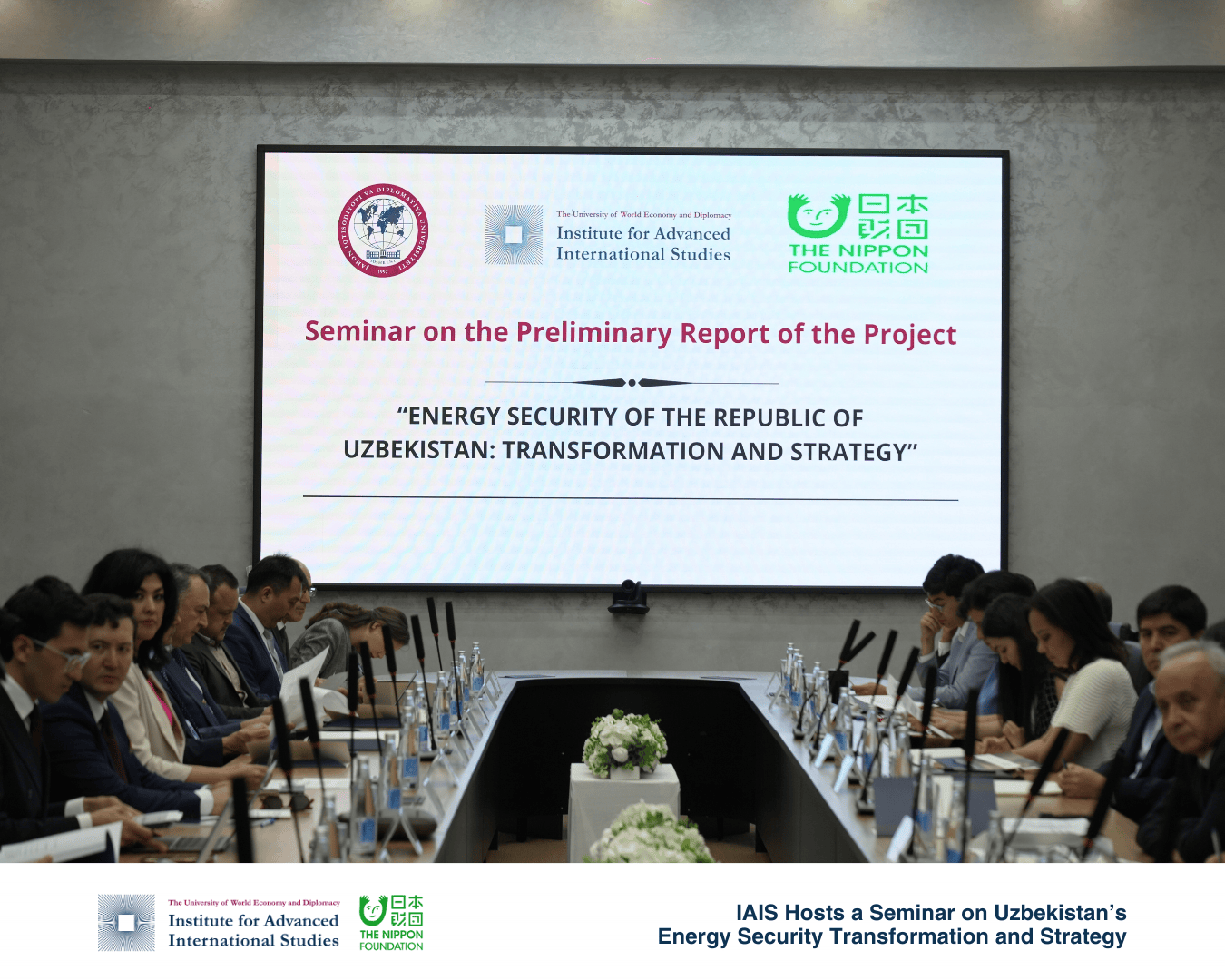
The Institute for Advanced International Studies became the venue for a seminar dedicated to the preliminary findings of the project “Energy Security of the Republic of Uzbekistan: Transformation and Strategy”, supported by Nippon Foundation (Japan). This event gathered leading experts, practitioners, and international partners to engage in an in-depth discussion on Uzbekistan’s energy security agenda amid the accelerating global energy transition and profound geopolitical shifts shaping the twenty-first century.
The seminar opened with welcoming remarks by Dr. Sodyq Safoev, First Deputy Chairman of the Senate of the Oliy Majlis and Rector of UWED, joined by Dr. Takashi Arikawa, Executive Director of the Nippon Foundation. In their remarks, they emphasized the importance of balancing energy diversification with sustainable growth and environmental commitments while strengthening regional cooperation mechanisms and institutional capacities, underscoring the strategic significance of the project for Uzbekistan’s long-term energy policy and sustainable development goals.
Following the opening session, Dr. Akram Umarov, First Vice-Rector of UWED and Director of IAIS, presented the preliminary results of the study, which seeks to provide a comprehensive assessment of Uzbekistan’s energy security priorities in the face of new technological, environmental, and economic realities. He noted that the findings of the project would serve as an analytical foundation for policy recommendations aimed at ensuring the country’s energy independence, modernization of its infrastructure, and greater resilience in the face of global uncertainties.
The seminar featured an expert discussion involving leading experts and officials of the energy sector. Umid Mamadaminov, Deputy Minister of Energy of Uzbekistan, particularly stressed the government’s commitment to guaranteeing uninterrupted energy supply for industrial and household needs, as well as the strategic importance of developing nuclear energy capacities. This point was further developed by Otabek Amanov, Deputy Director for Capital Construction at the Atomic Energy Agency and the SE “NPP Construction Directorate”, who outlined the progress made in the construction of Uzbekistan’s first nuclear power plant and its potential role in strengthening national energy independence, reducing reliance on fossil fuels, and contributing to climate sustainability efforts.
The legal and institutional dimensions of energy security were addressed by Komil Rashidov, Head of the Sector of Legislation in the Economic Sphere at the Institute of Legislation and Legal Policy under the President of Uzbekistan, who highlighted the need for a comprehensive legal framework to attract private investments, regulate energy markets, and promote environmental responsibility. Complementing these perspectives, Umid Yakubkhodjaev, Member of Parliament of Uzbekistan, drew attention to the geopolitical and diplomatic aspects of energy security, stressing the importance of regional energy cooperation and cross-border infrastructure projects for Uzbekistan’s role as a key energy hub in Central Asia.
From the academic and analytical perspective, Dr. Gavkhar Sultanova, Head of the Center for Economic Diplomacy at IAIS, explored the economic and security implications of energy transformation, noting the strategic importance of integrating research-based evidence into national decision-making processes. Jakhongir Saliev from the Center for Energy Diplomacy and Geopolitics at IAIS further examined the regional dimension of energy diplomacy, underlining the need for Uzbekistan to capitalize on its geographic position to enhance energy transit and export opportunities while engaging in constructive dialogue with neighboring states and international partners.
In his closing address, Dr. Safoev reflected on the rich discussions held during the seminar, noting that the preliminary report marks an important milestone in shaping Uzbekistan’s long-term energy strategy. He stressed that the ideas and recommendations emerging from the event would feed into a broader expert dialogue aimed at preparing a comprehensive set of policy proposals for the government and key stakeholders.